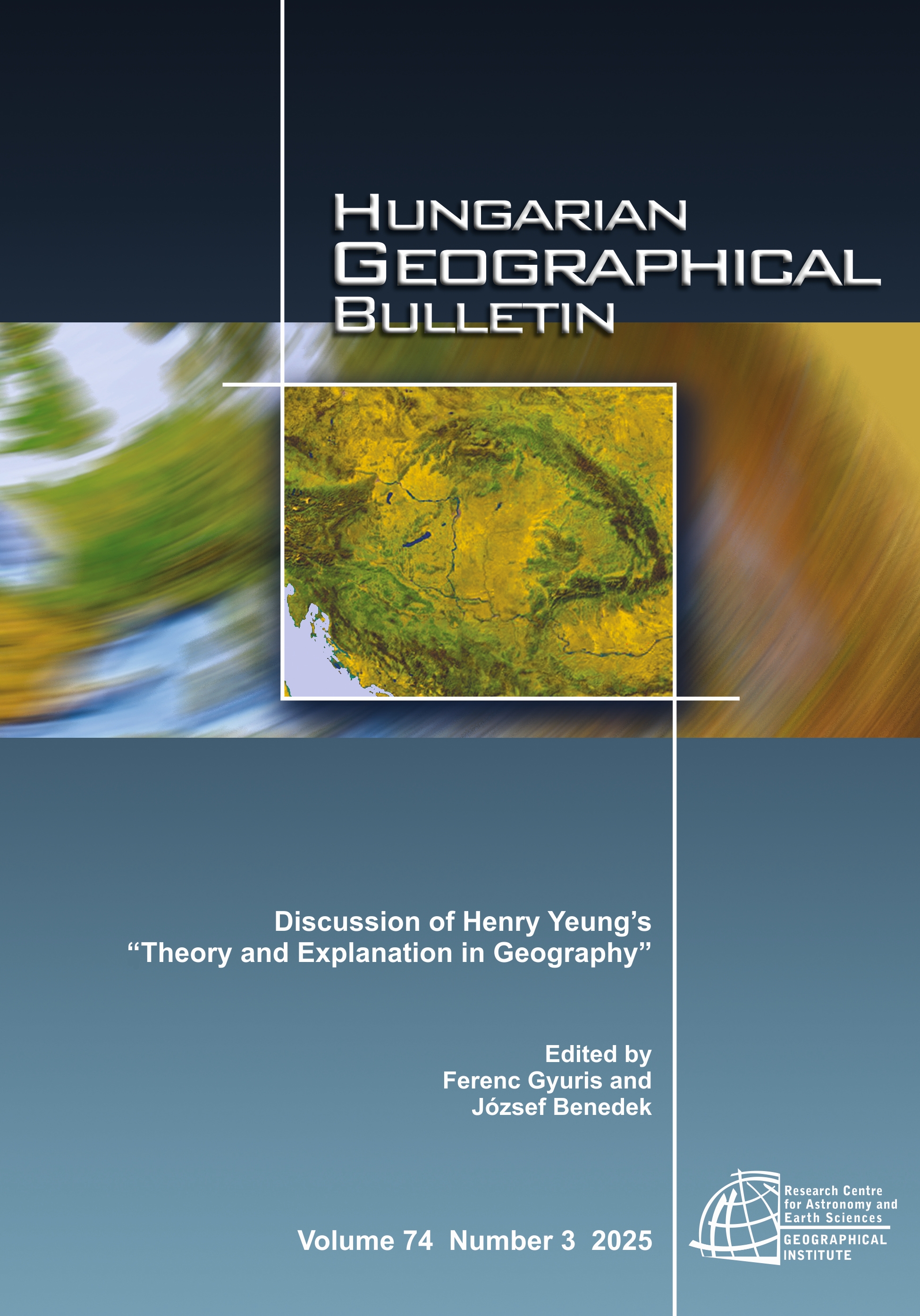The ironic misfortunes of ‘geographic theory’. Sceptic musings on a sexy oxymoron
Abstract
In this short piece, I engage with Henry W. Yeung’s (2024) diagnosis of a ‘philosophy envy’ affecting contemporary human geography to partially support his interpretation and equally argue against it. While I read geography’s infatuation with changing philosophical vogues as resulting in a deleterious theoretical hubris, the reasons for the academic and political pedigree that prevailing forms of geographic theory have purchased require a deeper epistemic scrutiny (and perhaps also a bit of spoof) than Yeung’s book allows for. Consequently, after preliminary derision of globalised scholarly infatuation with theory-making, I turn attention to two features of the epistemic structures underpinning mainstream critical geography, namely, constructivist schemes and parochial modes of justification, briefly taking issue with both. I end with a final coda about what could be expected of Theory of Geography as a subfield, calling simultaneously for a more substantive and purposeful philosophical reflection in geography and a sceptical take on theory to curve down its pure vanity.
References
AWCOCK, H. 2021. Stickin’ it to the man: The geographies of protest stickers. Area 53. (3): 405–552. https://doi.org/10.1111/area.12720
BARNES, T. and SHEPPARD, E. (eds.) 2019. Spatial Histories of Radical Geography: North America and Beyond. Oxford, Wiley. https://doi.org/10.1002/9781119404781
BARNETT, C. 1998a. Cultural twists and turns. Environment and Planning D: Society and Space 16. (6): 631–634. https://doi.org/10.1068/d160631
BARNETT, C. 1998b. The cultural turn: Fashion or progress in human geography? Antipode 30. (4): 379–394. https://doi.org/10.1111/1467-8330.00085
BERG, L., BEST, U., GILMARTIN, M. and LARSEN, H.G. (eds.) 2022. Placing Critical Geographies. Historical Geographies of Critical Geography. London, Routledge. https://doi.org/10.4324/9781315600635
BLOMLEY, N. 2006. Uncritical critical geography? Progress in Human Geography 30. (1): 87–94. https://doi.org/10.1191/0309132506ph593pr
BLOMLEY, N. 2007. Critical geography: Anger and hope. Progress in Human Geography 31. (1): 53–65. https://doi.org/10.1177/0309132507073535
BLOMLEY, N. 2008. The spaces of critical geography. Progress in Human Geography 32. (2): 285–293. https://doi.org/10.1177/0309132507084401
BLUMENBERG, H. 1987. Das Lachen der Thrakerin. Eine Urgeschichte der Theorie. Frankfurt am Main, Suhrkamp.
BODDEN, S. 2023. Working through our differences: Limits of ontology in the ordinary lives of critical geographical theory. Dialogues in Human Geography. Advance online publication, 1–19. https://doi.org/10.1177/20438206231221618
BOGHOSSIAN, P. 2006. The Fear of Knowledge. Oxford, Oxford University Press. https://doi.org/10.1093/acprof:oso/9780199287185.001.0001
CARTER-WHITE, R., DOEL, M.A. and SHUBIN, S.V. 2024. Maurice Blanchot’s troubling geography: Neutralizing key spatial and temporal concepts in the wake of deconstruction. Progress in Human Geography 48. (4): 475–494. https://doi.org/10.1177/03091325241257536
CASTREE, N. 2000. Professionalisation, activism, and the university: Whither ‘Critical Geography’? Environment and Planning A: Economy and Space 32. (6): 955–970. https://doi.org/10.1068/a3263
CHIESA, L. 2014. Italian Thought Today. London, Routledge. https://doi.org/10.4324/9781315796444
COMPAGNON, A. 1998. Le Démon de la Théorie. Litterature et sens Commun. Paris, Seuil.
CONWAY, P. 2025. Detour. In The Promise of Cultural Geography. Eds.: ZHANG, V. and ANDERSON, B., Bristol and Durham, Cultural Geography (Un)limited Edition, 51–52.
CRESWELL, T. 2013. Geographic Thought. A Critical Introduction. Oxford, Wiley.
CUSSET, F. 2003. French Theory. Foucault, Derrida, Deleuze & Cie et les mutations de la vie intellectuelle aux États-Unis. Paris, Editions La Découverte.
DARDOT, P. and LAVAL, C. 2010. La Nouvelle Raison du Monde. Essai sur la Société Néolibérale. Paris, Editions La Découvert. https://doi.org/10.3917/dec.dardo.2010.01
DAVIDSON, M. 2025. Urban theory in post-truth times. Dialogues in Urban Research 3. (1): 3–7. https://doi.org/10.1177/27541258251322237
DIXON, D. and JONES III, J.P. 2004. What next? Guest editorial. Environment and Planning A: Economy and Space 36. (3): 381–390. https://doi.org/10.1068/a3603ed
DOEL, M. 2024. Carcinogenic geography: On the history and philosophy of geography. Journal of Historical Geography 85. 55–57. https://doi.org/10.1016/j.jhg.2024.03.005
ERNSTE, H. 2018. The geography of spheres: An introduction and critical assessment of Peter Sloterdijk's concept of spheres. Geographica Helvetica 73. 273–284. https://doi.org/10.5194/gh-73-273-2018
ERNSTE, H. 2023. Critical critical posthumanism in human geography. Geographica Helvetica 78. 567–580. https://doi.org/10.5194/gh-78-567-2023
FLEISCHMANN, L. and EVERTS, J. 2024. Abject lives: An introduction. Political Geography 111. May 103102. https://doi.org/10.1016/j.polgeo.2024.103102
GUMBRETCH, H.U. 2014. Our Broad Present. Time and Contemporary Culture. New York, Columbia University Press. https://doi.org/10.7312/gumb16360
HACKING, I. 1999. The Social Construction of What? Cambridge, Harvard University Press. https://doi.org/10.2307/j.ctv1bzfp1z
HÄKLI, J. 2020. What can flat ontology teach the legislator? Dialogues in Human Geography 10. (3): 370–373. https://doi.org/10.1177/2043820620940055
HALVORSEN, S. 2018. Cartographies of epistemic expropriation: Critical reflections on learning from the South. Geoforum 95. 11–20. https://doi.org/10.1016/j.geoforum.2018.06.018
HANMETT, C.R. 1997. The sleep of reason? Environment and Planning D. Society and Space 15. 127–128. https://doi.org/10.1068/d150127
HANMETT, C.R. 2001. The emperor's new theoretical clothes, or geography without origami. In Market Killing. Eds.: PHILO, C. and MILLER, G., Singapore, Longman Press Publishing, 158–169.
HARRISON, P. 2002. The caesura: Remarks on Wittgenstein's interruption of theory, or, why practices elude explanation. Geoforum 33. (4): 487–503. https://doi.org/10.1016/S0016-7185(02)00032-5
HARRISON, P. 2007. “How shall I say it … ?” Relating the non-relational. Environment and Planning A: Economy and Space 39. (3): 590–608. https://doi.org/10.1068/a3825
HARVEY, D. 1989. The Condition of Postmodernity. An Inquiry into the Origins of Cultural Change. Cambridge and Oxford, Blackwell.
JAKOBSEN, P., JÖNSON, E. and LARSEN, H.G. 2022. Socio-Spatial Theory in Nordic Geography. Intellectual Histories and Critical Interventions. Cham, Springer. https://doi.org/10.1007/978-3-031-04234-8
KEIGHREN, I., ABRAHAMSSON, C. and DELLA DORA, V. 2013. On canonical geographies. Dialogues in Human Geography 2. (3): 296–312. https://doi.org/10.1177/2043820612468534
KLINKE, I. 2023. Review of Benedikt Korf: Schwierigkeiten mit der kritischen Geographie. AAG Review of Books 11. (3): 245. https://doi.org/10.1080/2325548X.2023.2207952
KORF, B. 2021. German theory: Cosmopolitan geographies, counterfactual histories and the (non)travel of a ‘German Foucault’. Environment and Planning D: Society and Space 39. (5). 925–944. https://doi.org/10.1177/0263775821989697
KORF, B. 2022. Schwierigkeiten mit der kritischen Geographie: Studien zu einer reflexiven Theorie der Gesellschaft (Difficulties with critical geography: Studies toward a reflexive theory of society). Bielefeld, Transcript. https://doi.org/10.14361/9783839462300
KORF, B. 2023. After critique: Cynicism, scepticism and the politics of laughter. Theory, Culture & Society 41. (4): 95–110. https://doi.org/10.1177/02632764231211899
LAKE, R.W. 2025a. On resisting the seduction of theory. Dialogues in Urban Research 3. (1): https://doi.org/10.1177/27541258241280589
LAKE, R.W. 2025b. Mind the gap. Dialogues in Urban Research 3. (1): https://doi.org/10.1177/27541258241280589
LARSEN, H.G. 2022. Must be Marxist: A situated history of Danish radical geography. Antipode. A Radial Journal of Geography 54. (6): 1880–1900. https://doi.org/10.1111/anti.12870
MALPAS, J. 1999. Place and Experience. A Philosophical Topography. Cambridge, Cambridge University Press. https://doi.org/10.1017/CBO9780511487606
MALPAS, J. 2012. Putting space in place: Philosophical topography and relational geography. Environment and Planning D: Society and Space 30. (2): 226–242. https://doi.org/10.1068/d20810
MALPAS, J. 2022. In the Brightness of Place. Topological Thinking with and after Heidegger. Albany, SUNY Press. https://doi.org/10.1515/9781438490045
MARQUARD, O. 1973. Schwierigkeiten mit der Geschichtsphilosophie. Frankfurt, Suhrkamp Verlag.
MARQUARDT, N. 2021. Adorno’s afterlives and the agenda of an anti-fascist geography. Geographische Zeitschrift 109. (2–3): 96–100. https://doi.org/10.25162/gz-2021-0007
MELGAÇO, L. and PROUSE, C. (eds.) 2017. Milton Santos: A Pioneer in Critical Geography from the Global South. Cham, Springer. https://doi.org/10.1007/978-3-319-53826-6
MINCA, C. 2016. Italian studies, Italian theory and the politics of translation. Environment and Planning D: Society and Space 35. (5): 822–829. https://doi.org/10.1177/0263775816656526
MITCHELL, D. 2025. Bob Lake's veil of ignorance. Dialogues in Urban Research 3. (1): 33–37. https://doi.org/10.1177/27541258251315133
OSWIN, N. 2020. Another geography. Dialogues in Human Geography 11. (1): 9–18. https://doi.org/10.1177/2043820619890433
PHILO, C. 2021. Nothing-much geographies, or towards micrological investigations. Geographische Zeitschrift 109. (2–3): 73–95. https://doi.org/10.25162/gz-2021-0006
PHILO, C. 2025. Adorno and the Antifascist Geographical Imagination. Edinburgh, Edinburgh University Press. https://doi.org/10.1515/9781399544696
PUENTE-LOZANo, P. 2023. A critique of spatial reason. Space and the philosophies of critical geography. Paper given at the RGS-IBG 2023 Annual Conference, 31 August 2023, London.
PUENTE LOZANO, P. 2024. In search of 'a properly geographical theorist'. Progress in Human Geography 48. (4): 495–505. https://doi.org/10.1177/03091325241257788
ROSA, H. 2015. Social Acceleration: A New Theory of Modernity. New York, Columbia University Press.
ROY, A. 2020. ‘The shadow of her wings’: Respectability politics and the self-narration of geography. Dialogues in Urban Research 10. (1): 19–22. https://doi.org/10.1177/2043820619898899
SAVOLAINEN, J., CASEY, P.J., MCBRAYER, J.P. and SCHWEDTLE, N.P. 2023. Positionality and its problems: Questioning the value of reflexivity statements in research. Perspectives on Psychological Science 18. (6): 1331–1338. https://doi.org/10.1177/17456916221144988.
SCHÖPF, C.M. 2020. Conversations on the Global South – The coloniality of global knowledge production: Theorizing the mechanisms of academic dependency. Social Transformations Journal of the Global South 8. (2): Article 2. https://doi.org/10.13185/2799-015X.1144
SMITH, N. and KATZ, C. 1993. Grounding metaphors. Grounding metaphor: Towards a spatialized politics. In Place and the Politics of Identity. Eds.: KEITH, M. and PILE, S., London and New York, Routledge, 67–83.
SMITH, N. 1996. Rethinking sleep. Environment and Planning D: Society and Space 14. 505–506. https://doi.org/10.1068/d140505
SMITH, N. 1997. Beyond sleep. Environment and Planning D: Society and Space 15. (2): 134–135. https://doi.org/10.1068/d150127c
TONKISS, F. 2025. Urban theory in anti-theoretical times. Dialogues in Urban Research 3. (1): 50–54. https://doi.org/10.1177/27541258251323809
VALDECANTOS, A. 2025. Por qué no existe la «Spanish Theory». La querella española. (Where there is no «Spanish Theory». The Spanish dispute). Jot Down Cultural Magazine. Online publication. https://www.jotdown.es/2024/07/por-que-no-existe-la-spanish-theory/.
YEUNG, H.W. 2024. Theory and Explanation in Geography. Hoboken, NJ, Wiley. https://doi.org/10.1002/9781119845515
YEUNG, H.W. 2025. Decentering Anglo-American geography: Theory development and “theorizing back” from an Asian perspective. Asian Geographer March 2025. Online publication. https://doi.org/10.1080/10225706.2025.2475624
Copyright (c) 2025 Paloma Puente Lozano

This work is licensed under a Creative Commons Attribution-NonCommercial-NoDerivatives 4.0 International License.






